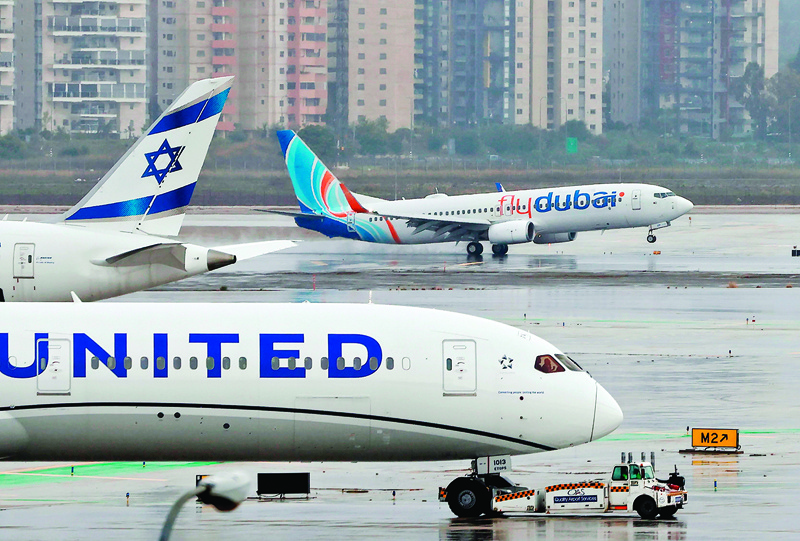
TEL AVIV: A flight operated by budget airline flydubai landed in Tel Aviv yesterday, the first scheduled commercial service between the two cities following the normalization of ties between the UAE and Israel. Israeli Prime Minister Benjamin Netanyahu, on hand for the arrival of the inaugural flight after its nearly four-hour trip, called it "a moment of history". "As-salaam alaikum (Peace be upon you)," he said to arriving passengers. "Come again and again and again."
The United Arab Emirates in September signed a landmark US-brokered deal to formalize relations with Israel, the first such agreement by an Arab state in the Gulf. Commenting on the accord in a tweet yesterday, UAE President Sheikh Khalifa bin Zayed Al-Nahyan said it would foster "prosperity and progress" in the Middle East.
With their economies hard hit by the coronavirus pandemic, the UAE and Israel are hoping for rapid dividends from the normalization deal, including an influx of tourists as Dubai enters its winter high season. "The start of scheduled flights will contribute to economic development and create further opportunities for investment," flydubai CEO Ghaith Al-Ghaith said when the service was announced earlier this month.
The Dubai carrier will fly the route twice daily, and Israeli airlines El Al and Israir are both expected to launch their commercial services between the cities next month. Etihad Airways, based in the UAE capital Abu Dhabi, has said it will begin flying to Tel Aviv in March 2021. The UAE became only the third Arab country to normalize ties with Israel, following Egypt in 1979 and Jordan in 1994. The two countries have already signed treaties on visa-free travel - although that is yet to come into force - along with accords on investment protection, science and technology.
'Circle of normalization'
Since the historic agreement, Bahrain has also forged ties with Israel, while Sudan has agreed to do so in principle. The agreements shattered a longstanding Arab consensus that there should be no normalization with Israel until it reaches a comprehensive peace deal with the Palestinians. Several Gulf Arab states have for years been quietly building relations with Israel on the basis of shared animosity towards Iran, with the US supporting the process.
Regional heavyweight Saudi Arabia has so far refrained from formalizing ties with Israel but has given the green light to overflights from the Jewish state, in an implicit sign of approval. Netanyahu reportedly met Saudi Crown Prince Mohammed bin Salam in the futuristic Red Sea city of Neom on Sunday, fuelling speculation that the kingdom was moving towards normalization with the Jewish state. Riyadh has denied the any such meeting took place.
Asked whether he expected Saudi flights to one day be landing in Tel Aviv, Netanyahu said: "The circle of normalization will get wider, there will be more countries in the coming months." After the UAE deal was announced by President Donald Trump in August, El Al flew a delegation of US and Israeli officials - led by Trump's son-in-law Jared Kushner - to Abu Dhabi in an historic direct service between the two countries. That was followed by an official visit by a UAE delegation to Tel Aviv as well as a string of charter flights carrying business groups. - AFP










